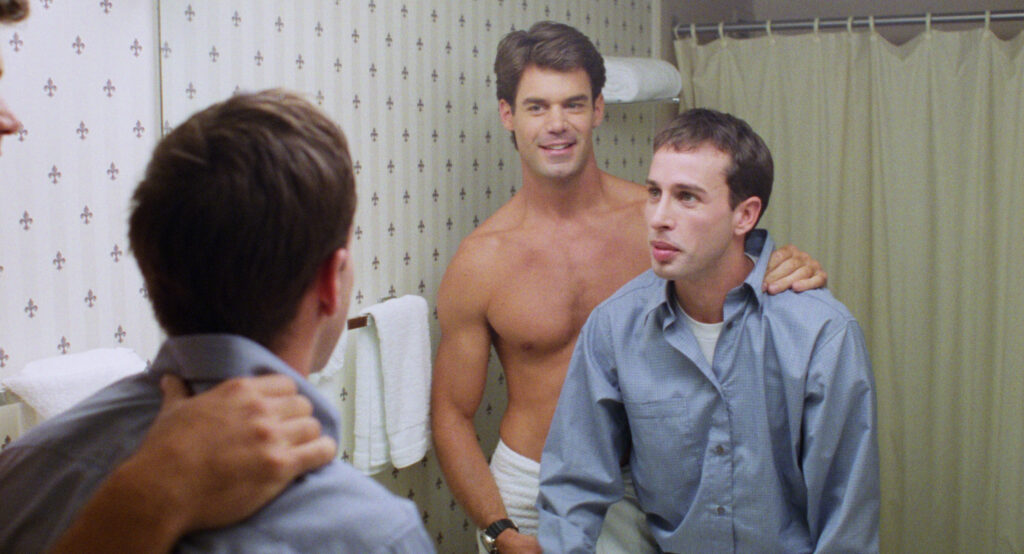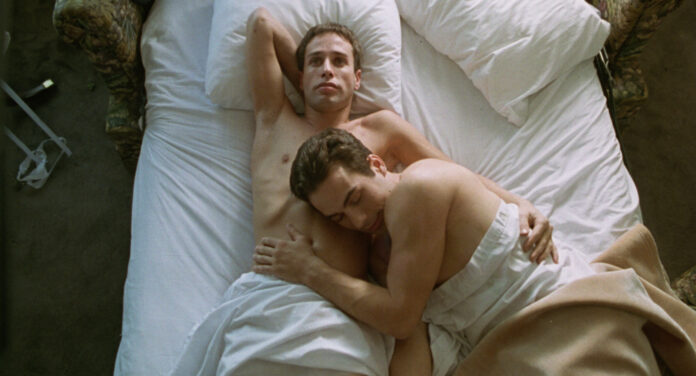The 1997 gay romcom, “I Think I Do,” written and directed by Brian Sloan, is being reissued in a 4K version on iTunes and Amazon on April 19 for its 25th anniversary. The film, which features a terrific ensemble cast, is as fresh and as frothy now as it was upon release.
“I Think I Do” opens at George Washington University, where six friends are roommates. Carol (Lauren Vélez) and Matt (Jamie Harrold) are coupled. Beth (Maddie Corman) wants to be coupled with Eric (Guillermo Díaz). And Bob (Alexis Arquette) is crushing on his straight roommate Brendan (Christian Maelen), who flirts with Sarah (Marianne Hagan). After Bob makes an unwanted pass at Brendan at a Valentine’s Day party, there is tension between the guys.
Cut to five years later, when Carol and Matt are getting married. Bob is a bridesmaid, and now dating soap opera star Sterling Scott (Tuc Watkins), who wants to marry him. Beth is still chasing Eric, and when Brendan unexpectedly shows up, Sarah keeps hoping to bed him. However, Brendan is fixated on — and wants to fix things with — Bob. Needless to say, complications ensue.
Sloan makes all the romantic antics amusing with droll one-liners, some clever slapstick and sight gags, as well as some screwball comedy plotting — as when Bob and Brendan are forced to share a bed in one scene. The filmmaker spoke with PGN about his charming romcom.
I had real nostalgia for this film watching it again. Looking back on “I Think I Do” now, do you view it with affection, or do you see all the things you wish you could have changed?
I just want to make it look and sound better, but I didn’t want to make any changes. People are nostalgic for the film, so I want them to see the movie they saw. It is very much a record in the time in which I made it. It was more “clean up the car” rather than rebuild it.
What do you recall about the film’s initial release?
When it came out, the film was released in 50 cities in the U.S. We got great reviews, but we didn’t have a marketing budget. A lot of people did see it, and it aired on Logo when that channel first started out. People know it, but it didn’t become this breakout hit — which we would have loved it to do — but breakouts have to have the money muscle behind them to make that cultural stamp.
You feature several gay and queer actors in the film (Alexis Arquette, Tuc Watkins, Guillermo Diaz), and not all of them in gay roles. Can you talk about the climate of making a queer film like “I Think I Do” 25 years ago? It was a big deal for gay actors to play gay roles and not every gay actor was out back then.
We spent almost six months casting because we were having trouble casting the men. Agents would not send their clients to audition. There was a huge stigma for a young actor to play a gay role, and in some ways, it was worse if they were gay. You are confirming everyone’s worst fear, and you won’t have a career. That was the feeling in the industry for agencies, managers and executives. We fought to get folks to show up just for an audition. We made offers to actors, and I’m sure mostly the agents and managers were saying no.
When we cast Christian Maelen, it was a week before we started. He came in because he was a messenger who showed up in the office. The casting director saw him and said, “What are you doing here? You passed on this three months ago!” He had never heard about the movie. His managers passed [without telling him]. He fired them once he was cast, which is to Christian’s credit.
The film is a quarter life crisis movie. These are mostly 26-27-year-olds who have to grow up and be responsible adults. The film is now the age of its characters!
How much was the film based on your experiences and friendships?
The film is having a quarter life crisis as well! It was inspired by my friends in college, and I had an amazing group of friends that I lived with and hung out with. They encouraged my creativity. They did not have an issue with me being out. It was accepted and that was unique at the time. It was often the opposite — you would come out and lose your friends. I feel lucky that didn’t happen and I wanted to make a film about that. This is my experience, and I think this will be the experience in the future. That has played out too, 25 years later.

I love all the talk about love and marriage, dating and relationships. Your film is full of amusing jokes but also insights about practical vs. lucky. Can you talk about your views on love, marriage, dating and relationships and how they influenced the script and the characters?
At that time, the idea of gay marriage was really just an idea. People read the script and they were confused — you can’t get married. But this is the world I want things to be like. It was 1994-5, when I started writing the script. Why can’t gay people get married? That should be totally an option. That was the world I wanted, and I felt very strongly that the film presents this world as is and not comment about it. The gay couples and the straight couples are both seen equally in the storyline. That’s what I thought in terms of gay marriage.
In terms of romance, the ideal thing is the mix of luckiness and finding the practicality. Hopefully a relationship is more than luck and romance. There are practical aspects to it. Do you really mesh with this person? Being best friends with your partner is so essential. You can have a relationship with a gorgeous hunky soap star, but is there a lot of common ground? I wanted to promote this idea that you marry your best friend. It is a standard convention in the straight romcoms, so it would be fun to bring that into the gay world.
You have made too few feature films. What can you say about your career after “I Think I Do”?
I made three features. I was working on things but a lot of times, those other projects didn’t happen. Getting financing for any film is a challenge and getting financing for a film with gay leads is ten times that challenge, especially in the 1990s. We had trouble financing this movie. There were a lot of films I wanted to make after this. We did readings and casting for projects, but getting the financing was hard in that indie space. It was important that the lead characters in my films were gay.
Even after “The Birdcage” (1996) was a huge hit, the general feeling was if you had a gay lead, you were still making a niche film. That it is not a film for a general audience. Things have changed in the last 25 years. The range of material is available, and actors are out and actors are driving these creative inventive shows centered on queer characters. Matt Bomer’s show [“Fellow Travelers”] would never have been made back then. I’d love to make more movies but it’s hard to make any movie.
“I Think I Do” is available on iTunes and Amazon on April 19.
